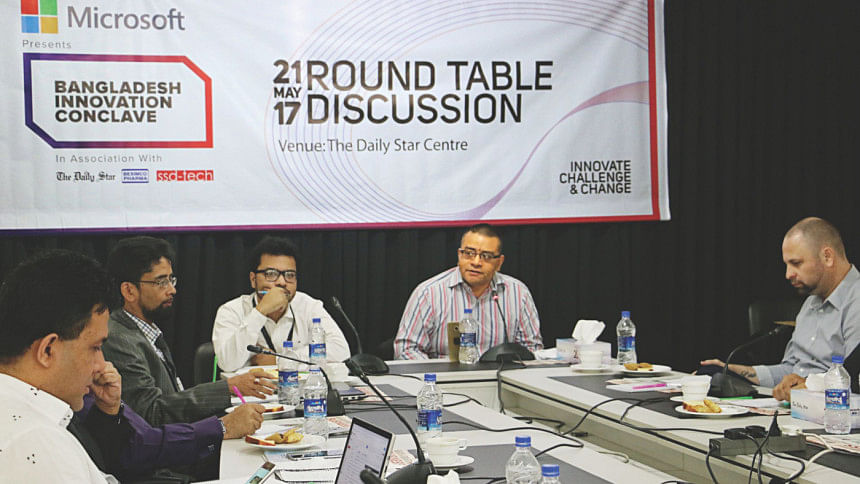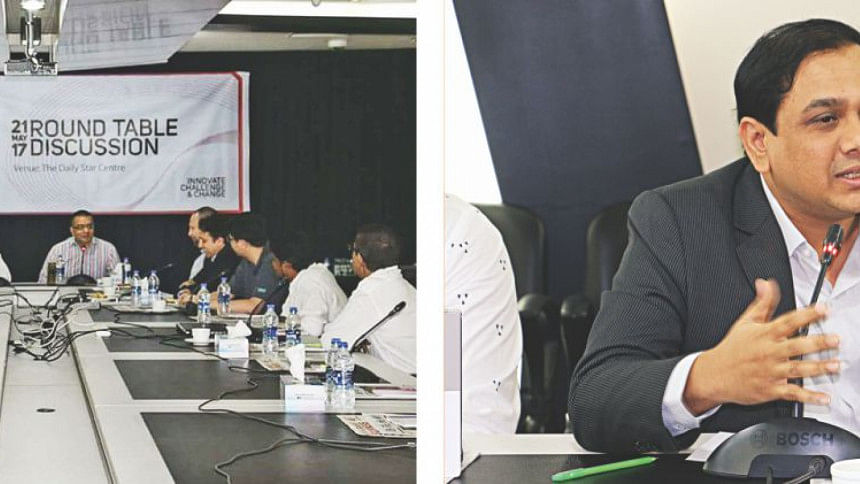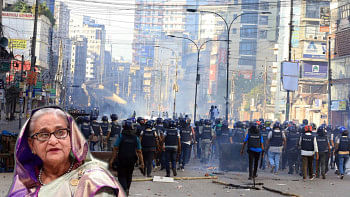Igniting Innovation within Bangladesh

For entities to survive and continue growing, there is no alternative to innovation. As we live in the era of the Fourth Industrial Revolution, it is important for Bangladesh to hold dialogues where citizens are made aware of the impact of innovation in different sectors such as business, social progress, government, readymade garments, NGO, education, health care, agriculture, tourism, the energy sector etc. Located at a critical injunction based on global economy and global technology, what Bangladesh does in the next ten years in the field of innovation would determine its economy for the future. The country's policy makers, entrepreneurs and industrialists need to start thinking about what technological innovation truly means for Bangladesh.
Organised by Bangladesh Brand Forum, Microsoft in association with The Daily Star, Beximco Pharmaceuticals Limited and SSD-Tech presented 'Bangladesh Innovation Conclave' on May 20, 2017. The core objective of the platform is to establish why innovation is the key to success for Bangladesh and its future, what innovation means for Bangladesh in the Fourth Industrial space, how to make innovation happen, how to push the innovation led growth in all 8 regions and what skill sets along with policy changes are required to assist the process of innovation in the country.
On May 21, 2017, attendees of the event were present for a post follow-up roundtable discussion held at The Daily Star Centre. Among the present were Shariful Islam, Managing Director of Bangladesh Brand Forum and the Founder of Bangladesh Innovation Conclave, Sabbir Hasan Nasir, Executive Director of ACI Logistics Ltd (Shwapno), Nazim Farhan Choudhury, Managing Director of ADCOMM, Mohammad Foysol Chowdhury, Director of R&D, Cambridge CMOS Sensors Limited., Anir Chowdhury, policy advisor at the Prime Minister's Office, Bangladesh, Tajdin Hassan, Head of Marketing, The Daily Star, Kristin Low,Co-Founder of Brinc Plus at Brinc.io and Founder of Design Thinking Asia, Raghu Das, CEO of IDTECHEx, Yi Chiao (Yitch) Cheng, Co-Founder, CTO and CIO of Hishab and Ex Director of IBM and ABM Sirajul Hossain, Chief Innovation Officer of Dnet. The roundtable was moderated by Iftakharul (Ifty) Islam, Chairman of Asian Tigers Capital Limited. The main aim of the roundtable was to come up with concrete strategies and policy recommendations based on the discussions and findings of the main event held the previous night.
“Digital Bangladesh” is not only a vision but also a roadmap for Bangladesh's future. The process of conducting surveys and assessments on what the country truly needs, its opportunities, and in what ways citizen are willing to contribute could help give a head start. It is important to define what innovation means -- not to people who are already creating solutions, but to those who are still unaware of its implementations. Speakers suggested that appointing a Chief Vision Officer by the policy makers of the country could help lead Bangladesh in the Fourth Industrial Revolution and also help plan the national innovation strategy. The revolution, as a whole, needs to be considered as a societal movement that challenges and changes the status quo. “Predicting the future, developing skill force, access to finance and effective regulatory bodies are key areas that need our focus,” says Sabbir Hasan Nasir.
Anir Chowdhury mentions the need to introduce innovation to private sectors of the country that would lead to solve life problems. Alongside, he also talks about the need of promoting innovation by the government and to improve the educational space within the country. “The 19th century assessment system would not create a 21st century world,” he emphasises. “We need our children to learn how to be creative, curious, how to connect the dots and most importantly, to question.”
Many still think of innovation as only limited to technological advancement. However, it could also be the product of invention and commercialisation that takes place through adaptation. An example of such successful innovation in Bangladesh is bKash. Customers are able to receive electronic money into their bKash accounts through salary, loan, domestic remittance, and other disbursements and eventually cash-out the electronic money at any of bKash's vast of agent network – an innovative service that does not require hi-tech gadgets but is heavily based on local customisation.
“You don't need to look too far, innovation is right in front of us,” says Yi Chiao (Yitch) Cheng. “Microfinancing by Dr. Yunus is one such example.”
The integration of technological innovation into our educational system has already begun. Popular online platform 10 Minute School is an innovation like no other in Bangladesh. It is the only site in Bangladesh through which students can learn from tutorials and live classes, practice from the given quizzes and model tests, monitor their progress, compare with their peers and others all for free. It enables both children and adults to learn, study and deliver.
Another landmark in the field of innovation has been set by The Daily Star. It introduced Facebook Messenger Bot on February, 2017 to create a deeper engagement with its readers, audience and consumers. “With innovations such as Uber and Airbnb disrupting the traditional processes, we as a print media outlet feel the constant urgency of changing and adapting to the innovation happening around,” says Tajdin Hassan, Head of Marketing, The Daily Star. “Surveys have shown that social media and mobile internet usage in Bangladesh is a rising trend. In response, The Daily Star has created a dedicated digital strategy team and launched its own Facebook Messenger Bot for news consumers,” he adds.

The Daily Star Facebook Messenger Bot is a simple tool that gives users a daily update on the morning with the day's top news stories. Users can swipe to see five news items and go beyond the breaking news by opting to read more stories and can also ask for news using keywords or the menu built inside the messenger.
However, it would be unwise to take innovation as a recent trend. “Throughout the past, our farmers have innovated ways of increasing rice production, improvised on what to feed farm animals to have a better outcome. These are very examples of innovation; it has always been there,” says Shariful Islam. “Right now, we need to start taking up ideas, create solutions and make opportunities. We also need to work to create technological home grown solutions looking into the future of Bangladesh.”
The Fourth Industrial Revolution is leading to the creation of huge opportunities for Bangladesh. Technological innovation can bring about profound changes on our landscape. Bangladesh Innovation Conclave's idea to “Innovate, Challenge and Change” comes at a time when it is evident that innovation would soon be considered as the currency of the future of Bangladesh. Perhaps, it would be wise to start innovating ideas that would help curb the current traffic condition of the city or design healthcare apps to assist people in remote areas or maybe even innovate ways of beating the cruel summer heat. It is time to redefine the famous quote “Necessity is the mother of invention” to “Innovate the necessity”. Revolutionary innovations await us.

 For all latest news, follow The Daily Star's Google News channel.
For all latest news, follow The Daily Star's Google News channel. 



Comments